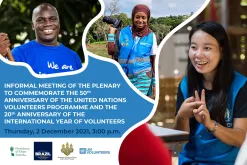Today, the United Nations Volunteers (UNV) programme launches the fourth State of the World’s Volunteerism Report (SWVR) at the United Nations General Assembly. The SWVR 2022, Building Equal and Inclusive Societies, presents new evidence on the relationship between volunteers and the state, and how these can redefine power relations to create societies that benefit all.
The 2022 State of the World’s Volunteerism Report, Building Equal and Inclusive Societies, presents new evidence on the relationship between volunteers and the state. It shows that the ways in which volunteers and state authorities interact, collaborate and partner are vital for the achievement of the 2030 Agenda for Sustainable Development and the Sustainable Development Goals.
Volunteers broker relationships and serve as mediators between communities and state authorities, in essence acting as bridge-builders. They also help transform unequal power relationships between ordinary citizens and state authorities. In doing so, they ensure that development processes are more people-centred and responsive to local needs.
Today, volunteers are critical for service delivery and social innovation. They are transforming unequal relations and finetuning the development agenda. They are adapting to the digital era and volunteering online. And many are volunteering throughout the life cycle, as youth or as senior citizens. --Mr Toily Kurbanov, Executive Coordinator of UNV
The SWVR draws from case studies across five regions: Africa, Asia and the Pacific, Europe and the Commonwealth of Independent States, the Arab States, and Latin America and the Caribbean. Its findings demonstrate that volunteers do not simply support governments and other stakeholders in service delivery, for example. Increasingly, they are agents of change, advocating and prioritizing the development issues that are important to their communities.
The report calls on all to leverage volunteers’ intrinsic development expertise. To address gender, disability, and other imbalances in volunteering. To recognize informal volunteers’ work as they receive less support. To foster social innovation. And to invest in volunteer networks, data collection and research. --Mr Toily Kurbanov
With rising inequalities worldwide, United Nations Secretary-General Antonio Guterres has spelled out the need for a new social contract that creates equal opportunities and respects the rights and freedoms of all. Serious development challenges – from climate emergency to the effects of the COVID-19 pandemic – have shown us that we need to change the way we live, work and cooperate. It is time for a global reset with a renewed emphasis on inclusion.
Despite the devastating socio-economic impacts of the pandemic, global interest in volunteering has not waned. Whether in person, or increasingly online, dedicated volunteers are in service.
As countries and regions grapple with serious challenges, one thing is clear: no single stakeholder, entity or sector can address these alone. Now more than ever, partnerships are vitally important.
"In this new normal and with all the challenges we face, it will be incredibly important for volunteers to be included as essential partners right from the start," says Gladys Mutukwa, a 73-year-old volunteer from Zambia.
The SWVR, through research conducted by the International Labor Organization, estimates that 860 million people above the age of 15 volunteer every month. That means that every seventh person in our world today is a volunteer. Through resounding evidence, the SWVR 2022 encourages policy makers to tap into this vast resource and ‘Build Forward Better’, together with volunteers, for an equal and more sustainable future.
Editor's Note: Every three years, UNV produces the State of the World’s Volunteerism Report, a flagship UN publication designed to strengthen understanding on volunteerism and demonstrate its universality, scope and reach in the 21st century. Each report examines the contribution of volunteerism to peace and development through a specific theme.

